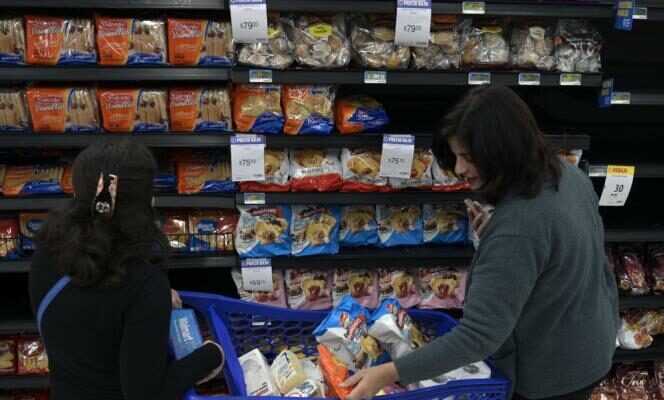Perplexed, Rodrigo Aguirre waits to be told the color. He has just ordered 300 grams of biscuits in a bakery in the hypercenter of Ensenada, in a street full of colorful stalls, cafes and banks in this popular city located 60 kilometers south of Buenos Aires. “Anyway, things are priceless, they make you pay what they want”, comments the 76-year-old retiree, a former employee of a service station, in reference to the chronic inflation of the country. This will be 180 pesos (1.50 euros, at the official rate). “Is it a lot, isn’t it a lot? I do not know. Prices are out of control”he grumbles. “Totally out of control! », confirms, laughing, the saleswoman, with a disconcerting naturalness. Here, in the space of ten days, the biscuits sold by weight jumped by more than 14%, she calculates.
In February, the fever continued to climb: 52.3% inflation, compared to the same period in 2021; 4.7% in just one month, the largest increase in the last eleven months. Food prices soared 7.5%. Since February 24 and the war in Ukraine, the cost of wheat, an essential component of Argentine tables, and even more of those of the most disadvantaged families turning to flour-based products, which are more satiating, has soared. “In a few days, the price went from 25,000 to 35,000 pesos per ton. The increase was carried over to flour and, therefore, to bread and all its derivatives”detailed the Ministry of Agriculture, on March 19.
However, Argentina is far from being dependent on Ukrainian wheat: the country exports en masse (nearly 14 million tonnes for the 2021-2022 campaign, making it the seventh largest exporter in the world). But manufacturers have aligned themselves with international prices, on the rise.
As early as mid-March, the president decided to conduct a “war on inflation”, who is “almost a curse that many grew up with”. Some measures have been announced, such as the creation of a fund to subsidize the price of flour, in order to return to February values. This fund is supplied by the two-point increase in export taxes on soybean oil and flour, from 31% to 33%. The government has also announced “monitored prices” for local shops, on a series of key products, such as in large supermarket chains.
“A drop in the ocean”
You have 59.09% of this article left to read. The following is for subscribers only.
